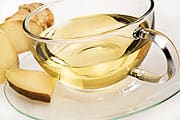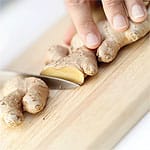Life Extension Magazine®
| Due to the powerful phenolic compounds found in ginger, this spice has been studied for its benefits for a wide range of ailments and health disorders. While often referred to as a root, ginger is in fact a spice that contains potent antioxidants such as shogaols, zingerone, and gingerols.1 These strong compounds have been linked to providing relief for dozens of issues, including cough, bronchitis, upper respiratory tract infections, migraine headaches, motion and morning sickness, rheumatoid arthritis, post-surgical pain, flatulence, loss of appetite, diarrhea, upset stomach, stomachache, colic, dyspepsia, and general and chemotherapy-induced nausea. It has even been used topically as an analgesic.1 Ginger has been used as a home remedy for thousands of years. Ginger’s HistoryThe health benefits of ginger have a history almost as old as civilization itself. Historians have found references to the use of ginger, known botanically as Zingiber officinale, in the writings of nearly every ancient society, including Chinese, Indian, and Roman. In fact, the ancient Roman Empire first started importing ginger nearly two thousand years ago.2 Due to its alluring smell, great taste, and medicinal properties, the spice became extraordinarily popular in Europe. This rise in demand, combined with the expensive cost of shipping the product from Asia, forced Europeans to find ways to make ginger less expensive and more readily available. They did this by introducing ginger to the West Indies, Mexico, and South America, and then exporting it back to Europe. Since ginger thrives in a tropical climate, it is produced in the United States in Hawaii, Florida, and California.1 Internationally, it is exported mainly from Jamaica, Fiji, India, China, and Australia.
Ginger’s BenefitsMotion SicknessMany prescription or over-the-counter products on the market that are developed to combat motion sickness or nausea have side effects like drowsiness and dry mouth. Ginger has shown in several studies that it may provide significant relief to the above symptoms without the detrimental side effects.3 In one study comparing ginger to a placebo in an attempt to measure its ability to reduce symptoms associated with motion sickness, ginger was measured to be potentially more effective than placebo.3 This trial studied 80 beginner-level sailors who were prone to motion sickness. Half of the group took powdered ginger and the other half took placebo. The half who took ginger experienced a reduction in vomiting and cold sweats compared to placebo. Morning SicknessGinger has been used as a home remedy for thousands of years, with one of the longest known uses as a treatment for morning sickness accompanying pregnancy. Researchers presented a study that finally put this folk remedy to the test. In a double-blind, randomized, placebo-controlled trial, a group of pregnant women ingested 125 mg of ginger extract four times a day for four days.4 All the women were less than 20 weeks pregnant, and the women who ingested the ginger showed significantly reduced symptoms of morning sickness, compared with women who consumed placebo. Inflammation
Ginger contains ultra-potent anti-inflammatory compounds called gingerols, which are the substances that many scientists believe are responsible for the reduction in inflammation people experience when they start taking ginger supplements regularly. Case in point, a recent study involving patients who tried conventional drugs to alleviate painful symptoms found that 100% of patients with muscular discomfort experienced relief of pain or swelling when they consumed ginger on a daily basis.2 In a compelling study published in Osteoarthritis and Cartilage, 29 patients with debilitating arthritis in the knee participated in a placebo-controlled, double-blind, crossover study.5 The study had each patient start with placebo or ginger, and then switch after 3 months, writing down the results. At the end of the first half-year of the study, the patients who were taking ginger experienced significantly less pain than those on the placebo. Additionally, the patients using ginger reported improvements on a standardized scale used to assess mobility. A separate study measuring the anti-inflammatory properties of red ginger in the Journal of Medicinal Food found positive results as well.6 In this study, Japanese researchers prepared a 40% ethanolic extract from dried red ginger and evaluated its anti-inflammatory activity. After confirming that antioxidant shogaols and gingerols suppressed production of inflammatory mediators, the researchers discovered that red ginger extract “has a potent suppressive effect on acute and chronic inflammation, and inhibition of macrophage activation seems to be involved in this anti-inflammatory effect.”6
Helps Reduce Chemotherapy-Induced NauseaChemotherapy-induced nausea is the type of stomach unease or discomfort that begins within 24 hours after the administration of chemotherapy. Many patients treated for cancer experience this awful side effect, which can lead to vomiting, dry heaving, and overall sickness. It is known that meals high in protein may offer some protection against the onset of nausea, and a study recently tested whether high-protein meals with added ginger had any beneficial effect. A team at Siena College in Loudonville, New York, studied this hypothesis on 28 patients with cancer who were receiving chemotherapy for the first time.7 Control group patients ate their normal diets, while another group drank a high-protein shake with ginger twice daily. The results were striking. Patients taking the high-protein shake with ginger reported significantly fewer instances of nausea, and electrical measurements of the stomach muscles revealed less gastric dysrhythmia, leading the researchers to conclude that high protein meals with ginger reduced the nausea that follows chemotherapy.7 Colon Cancer PreventionIn a study done by scientists at the University of Minnesota, gingerol exhibited anti-inflammatory and antitumorigenic effects.8 At first, scientists were unsure about why gingerol displayed such effectiveness against colon cancer, but the study revealed that the leukotriene A(4) hydrolase protein (LTA[4]H), whose activity can act as a catalyst for colon cancer cells, is targeted by gingerol.8
The researchers gave a group of specially bred mice an injection of gingerol three times a week before and after injecting human colorectal cancer cells into them. Tumors first appeared 15 days after mice were injected, but only 4 tumors were discovered in the gingerol group, as opposed to 13 in the control mice. The findings revealed that “gingerol effectively suppressed tumor growth in mice by inhibition of LTA(4)H activity…these findings support the anticancer efficacy of gingerol for the prevention of colorectal cancer.”8 Fights Ovarian CancerWhile the effectiveness of ginger extracts against inflammation and tumors has been shown above, perhaps ginger has the most promising effect in the fight against ovarian cancer. At the 97th Annual Meeting of the American Association for Cancer Research, Dr. Rebecca Liu and her team from the University of Michigan made a presentation about gingerol’s ability to kill ovarian cancer cells by inducing apoptosis (programmed cell death) and autophagocytosis (self-digestion).9 The presentation focused on Dr. Liu’s team’s experiments that examined the effects of a whole ginger extract containing 5% gingerol on several different ovarian cancer lines. While traditional chemotherapeutic agents suppress inflammation the same way ginger is purported to, the danger is that cancer cells may become resistant to the drugs. Dr. Liu believes that ginger may be unique in this respect because cancer cells show no sign of becoming resistant to its cancer-fighting properties. Her team’s data showing that exposure to ginger extract caused cell death in all ovarian cancer lines studied bolster this claim.9 | |||||
| References | |||||
If you have any questions on the scientific content of this article, please call a Life Extension® Wellness Specialist at 1-866-864-3027. |





